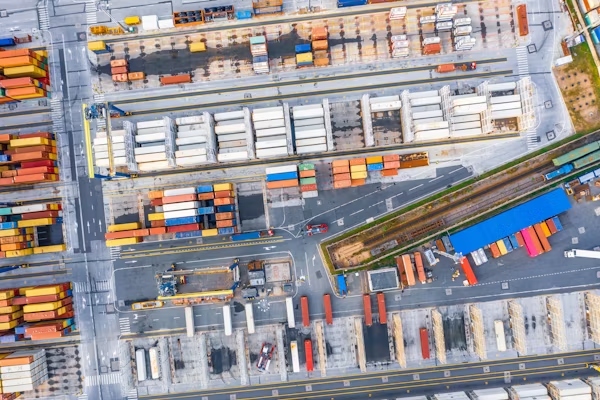The logistics and transportation industry in the United States is undergoing a major transformation fueled by rapid technological advancements. With increasing consumer demands for faster delivery, greater transparency, and cost efficiency, companies in this sector are turning to cloud computing and intelligent automation to stay competitive. Among the leading solutions facilitating this shift are Azure AI and automation tools, which empower U.S. logistics and transportation providers to optimize operations, improve decision-making, and enhance customer experiences.
The Logistics and Transportation Landscape in the USA
The U.S. logistics and transportation industry is vast and complex, involving millions of shipments daily across highways, rails, airways, and waterways. Challenges such as fluctuating fuel prices, driver shortages, regulatory compliance, and environmental concerns create pressure on companies to innovate. Additionally, the surge in e-commerce has heightened expectations for real-time tracking and rapid delivery, pushing logistics firms to adopt smarter technologies.
Cloud computing platforms like Microsoft Azure have become foundational in this digital evolution. Specifically, microsoft azure cloud service in USA offer scalable, secure, and intelligent solutions tailored to meet the unique needs of American logistics providers. With integrated AI and automation capabilities, Azure enables businesses to gain operational agility and resilience.
Leveraging Azure AI for Predictive Analytics and Demand Forecasting
One of the most significant benefits of Azure AI in logistics is predictive analytics. Through advanced machine learning models and data analysis, logistics firms can accurately forecast demand, anticipate delays, and optimize inventory levels.
Azure Machine Learning allows companies to process vast amounts of historical shipment, weather, and traffic data to predict future trends. For example, a trucking company can use AI-driven forecasts to plan routes proactively, avoiding congestion or adverse weather conditions. This results in reduced delivery times and fuel consumption.
Moreover, Azure Cognitive Services enable natural language processing (NLP) and image recognition to streamline documentation and inspection processes. Automated scanning of delivery receipts or damage reports helps speed up claims handling and compliance checks.
Automation with Azure Logic Apps and Power Automate
Automation is a critical factor in streamlining repetitive tasks in logistics operations. Azure Logic Apps and Power Automate provide low-code solutions to design workflows that integrate with existing systems seamlessly.
For instance, when a shipment status changes, Azure Logic Apps can trigger automatic notifications to customers, update inventory records, and notify warehouse teams to prepare for incoming goods. This end-to-end automation eliminates manual errors and accelerates communication across the supply chain.
Furthermore, automation tools can handle invoicing, billing, and regulatory filings, reducing administrative overhead. This allows logistics managers to focus on strategic decisions rather than routine paperwork.
Enhancing Fleet Management with Azure IoT and AI
Fleet management is another critical area where azure cloud services in USA have a transformative impact. Azure IoT Hub enables the connection and monitoring of thousands of vehicles in real time. Sensors installed on trucks can collect data on location, fuel usage, engine performance, and driver behavior.
This data is analyzed by Azure AI models to provide actionable insights. For example, predictive maintenance alerts help fleet managers schedule timely repairs before breakdowns occur, reducing downtime and repair costs. AI can also optimize routing based on traffic conditions, vehicle capacity, and delivery priorities.
Driver safety is enhanced through AI-powered monitoring systems that detect fatigue or unsafe driving patterns. Alerts can be sent instantly, helping prevent accidents and ensuring compliance with federal safety regulations.
Intelligent Warehouse Operations with Azure AI
Warehouse management is a vital component of logistics, and Azure AI is instrumental in driving efficiency here. Computer vision algorithms powered by Azure Cognitive Services can automate inventory tracking, reducing human errors and losses.
Robotic process automation (RPA) integrated with Azure services helps coordinate warehouse robots for picking, packing, and sorting tasks. This automation accelerates order fulfillment and adapts dynamically to changing order volumes.
Additionally, Azure AI-powered demand forecasting helps warehouses optimize stock levels, minimizing overstock and stockouts. This ensures smoother supply chain flow and improved customer satisfaction.
Real-Time Visibility and Transparency through Azure Maps and Analytics
Customer expectations in the U.S. logistics sector now include real-time shipment tracking and transparency. Azure Maps provides geospatial services that enable companies to offer accurate, real-time tracking interfaces.
Combined with Azure Stream Analytics, logistics providers can process live location and sensor data to update dashboards instantly. This capability enhances decision-making for dispatchers and provides end customers with up-to-date information on their deliveries.
This transparency fosters trust and loyalty among customers, which is crucial in the competitive transportation industry.
Security and Compliance with Azure Cloud Services in USA
Security and regulatory compliance are paramount in the logistics and transportation sector, which handles sensitive data and operates under stringent federal and state regulations.
Microsoft Azure offers robust security features such as Azure Security Center, identity management with Azure Active Directory, and encryption services that protect data in transit and at rest. The platform’s compliance certifications, including FedRAMP and CJIS, align with U.S. government requirements.
By leveraging azure cloud services in USA, logistics companies can ensure data integrity and compliance while focusing on operational innovation.
Scalability and Cost Efficiency
A major advantage of using Azure AI and automation tools is the flexibility to scale resources based on demand. During peak seasons or sudden demand spikes, logistics providers can quickly allocate additional computing power without costly infrastructure investments.
Azure’s pay-as-you-go pricing model ensures cost efficiency, enabling companies of all sizes—from large freight carriers to regional delivery startups—to adopt AI and automation without prohibitive upfront costs.
Real-World Success Stories
Several leading U.S. logistics companies have already embraced Azure cloud services to revolutionize their operations. For example, a national courier service integrated Azure Machine Learning for route optimization, reducing fuel costs by 15% and improving on-time deliveries.
Another freight company deployed Azure IoT and AI-powered predictive maintenance, cutting vehicle downtime by 20% and lowering maintenance expenses.
These success stories demonstrate how Azure’s AI and automation capabilities are becoming indispensable tools in the U.S. logistics and transportation sector.
The Road Ahead: Innovations Powered by Azure
Looking forward, the integration of Azure AI with emerging technologies such as autonomous vehicles and drone deliveries will further reshape the logistics landscape in the USA. Azure’s edge computing capabilities will enable faster processing of data close to the source, critical for real-time decision-making in autonomous transport.
Azure’s commitment to sustainability also aligns with the industry’s goal to reduce carbon footprints, supporting green logistics initiatives through data-driven insights and optimization.
Conclusion
The U.S. logistics and transportation industry is at the forefront of technological innovation, driven by the need for efficiency, transparency, and resilience. By harnessing azure cloud services in USA, logistics providers can leverage powerful AI and automation tools to streamline operations, reduce costs, and enhance customer satisfaction.
From predictive analytics and intelligent fleet management to automated workflows and real-time tracking, Azure offers a comprehensive ecosystem that addresses the complex challenges of modern logistics. As the industry continues to evolve, embracing Azure’s cloud-based AI and automation solutions will be key to staying competitive and delivering superior value in the fast-paced transportation sector.






